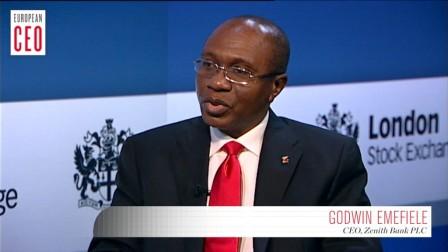Incoming central bank Governor Godwin Emefiele said a devaluation of the naira would be “devastating” for the economy.
The Central Bank of Nigeria’s exchange-rate policy is correct and the regulator needs to ensure Africa’s largest oil producer has a strong currency, Emefiele said in his first public comments since being nominated by President Goodluck Jonathan to the position.
“This is an import dependent economy,” Emefiele, 52, told a Senate hearing today in the capital, Abuja, before the upper house of parliament approved his appointment. “Devaluation is not an option.”
Emefiele, chief executive officer of Zenith Bank Plc, will succeed Lamido Sanusi, 52, whose suspension by Jonathan last month prompted the currency to drop to a record low as investors worried that the independence of the central bank will be compromised. That increased speculation policy makers will devalue the currency by lowering the midpoint of the naira peg from 155 per dollar in the face of dwindling foreign-currency reserves.
Nigeria’s reserves have declined 13 percent this year to $37.9 billion as of March 24. The naira has dropped 2.8 percent against the dollar on the interbank market in the period.
The decline in foreign-exchange reserves is due to a “speculative attack,” Emefiele said.
Emefiele will need to control inflation and steer the economy of Africa’s most populous nation through next year’s presidential election amid pressure to boost government spending, bolster the currency and convince investors of the independence of the central bank.
In its first meeting since Sanusi’s departure, the Monetary Policy Committee, led by acting GovernorSarah Alade, yesterday held its key interest rate at a record 12 percent and increased the cash reserve requirements on private sector deposits to 15 percent from 12 percent, citing the continued need for a tight monetary stance.
Jonathan suspended Sanusi for “financial recklessness and misconduct,” allegations he denied. His removal came after he alleged that billions of dollars of government oil revenue were unaccounted for.
A banker with 26 years of experience, Emefiele became the managing director of Zenith Bank, Nigeria’s second-largest lender by assets, in August 2010 after serving as deputy managing director from 2001.
He has a MBA degree from the University of Nigeria in Nsukka and lectured at the University of Port Harcourt, the institution where Jonathan taught before he entered politics.
via@Bloomberg



Leave a Reply